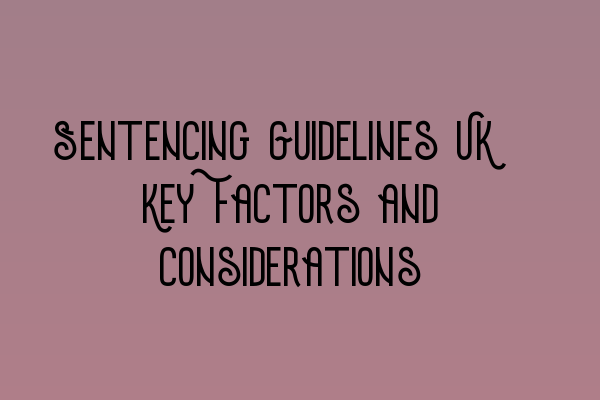Sentencing Guidelines UK: Key Factors and Considerations
When it comes to criminal law in the UK, understanding the sentencing guidelines is paramount. These guidelines provide a framework for judges and magistrates to determine appropriate sentences for specific criminal offenses. As a solicitor at SQE Criminal Law & Practice Law UK, it is essential to be well-versed in these guidelines to effectively represent and advise clients.
Key Factors in Sentencing Guidelines
The sentencing guidelines consider various factors that can influence the severity of a sentence. Some of these key factors include:
- The seriousness of the offense
- The defendant’s culpability
- The harm caused or intended
- The level of premeditation
- The defendant’s previous convictions
- Aggravating or mitigating factors
By carefully analyzing these factors, the court aims to ensure that the punishment fits the crime. For example, a first-time offender convicted of a minor offense may receive a less severe sentence compared to a repeat offender involved in a serious crime.
Considerations for Sentencing
In addition to the key factors, there are certain considerations that judges and magistrates must take into account when sentencing an individual:
- The Sentencing Council’s definitive guidelines for the specific offense
- Any relevant case law
- Any specific aggravating or mitigating factors unique to the case
- The defendant’s personal circumstances and background
- The impact of the offense on the victim(s) or society
By considering these factors and taking into account individual circumstances, the court aims to achieve a fair and just sentence that takes into account both the severity of the offense and the defendant’s personal circumstances.
Importance of Understanding Sentencing Guidelines
Understanding the sentencing guidelines is crucial for practitioners in the field of criminal law. It allows solicitors to accurately advise their clients on possible outcomes and negotiate more effectively on their behalf.
At SQE Criminal Law & Practice Law UK, we offer comprehensive SQE 1 and SQE 2 preparation courses to equip aspiring solicitors with the necessary knowledge and skills to navigate the diverse aspects of criminal law, including sentencing guidelines. Our SQE 1 Practice Exam Questions and SQE 1 Practice Mocks FLK1 FLK2 can help you assess your understanding of criminal law concepts and enhance your exam preparation.
To stay up-to-date with the latest SRA SQE exam dates and requirements, visit our SRA SQE Exam Dates page. We are committed to supporting individuals pursuing a career in criminal law and providing them with the resources they need for success.
Conclusion
In conclusion, sentencing guidelines are a crucial aspect of the UK criminal justice system. As a solicitor, it is essential to understand the key factors and considerations involved in determining appropriate sentences for criminal offenses. Familiarizing yourself with the guidelines allows you to provide informed advice and representation to your clients. If you are preparing for the SQE 1 or SQE 2 exams, be sure to explore our SQE 1 Preparation Courses and SQE 2 Preparation Courses to enhance your knowledge and improve your chances of success.
